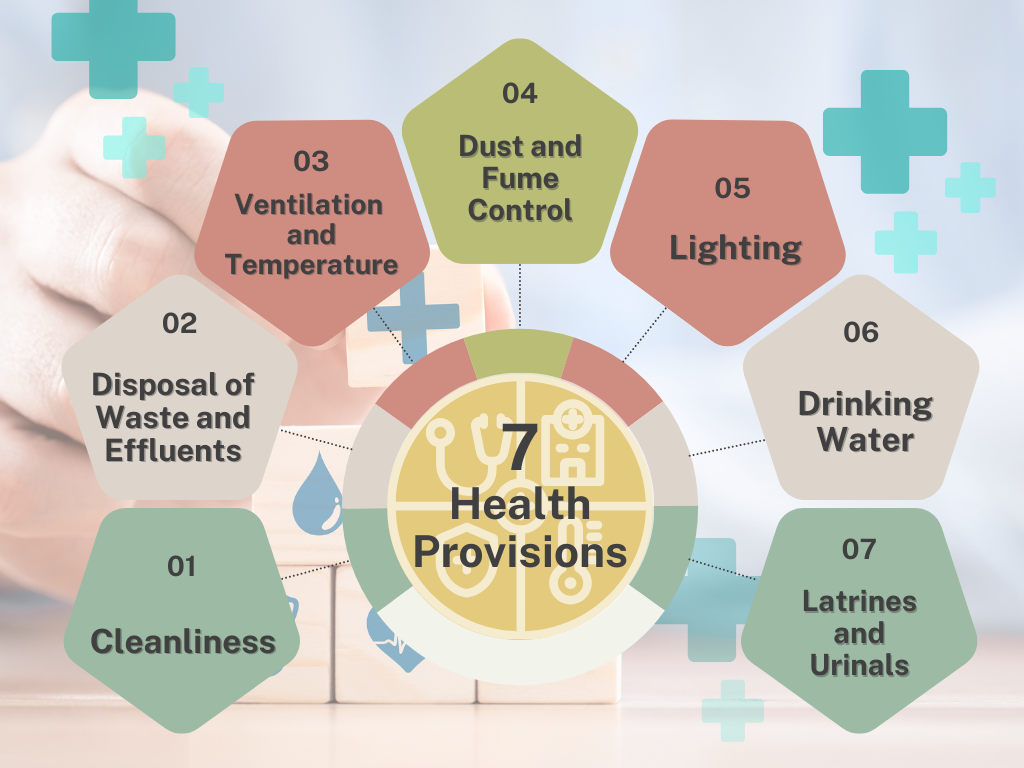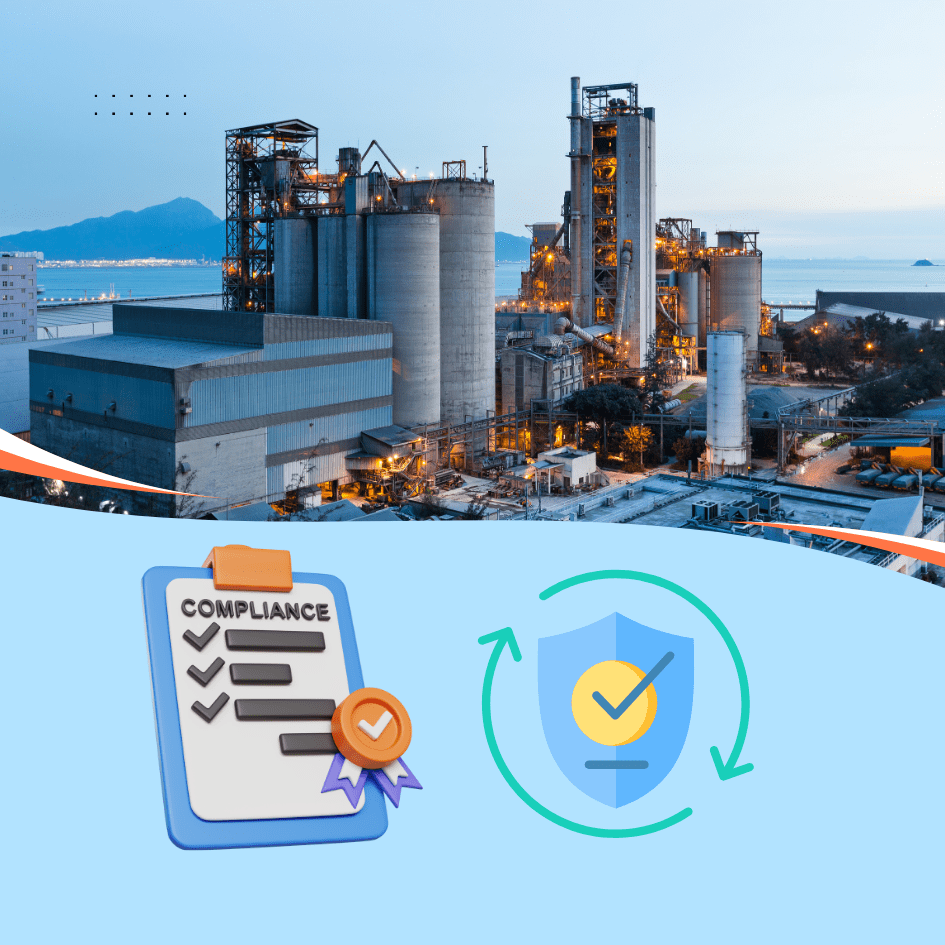Introduction to Factories Act:
The factory defined as “A factory is a facility or collection of structures where products are produced or assembled using machinery or labour.”

The Factories Act 1948 is an important part of Indian labour laws that regulates working conditions in factories to ensure the Industrial safety, health and welfare of workers. Enacted by the Indian Parliament, the Act aims to create a safe and conducive working environment, prevent exploitation of workers and protect workers’ rights. This comprehensive Act plays a pivotal role in establishing domestic industrial labour standards and practices, applicable to all manufacturing processes identified in the Act.
Historical Context and Significance of Indian Factory Act:

The roots of the act can be traced back to the British colonial period, where the industrialization of India saw the establishment of numerous factories. The first Factory Act in British India was introduced in 1881, primarily focusing on child labour and basic working conditions. Over the years, with the increasing complexity of industrial operations and the need for more robust labour protections, the legislation evolved.
The Factories Act of 1948 was a significant overhaul, reflecting the socio-economic changes post-independence and aiming to provide a comprehensive framework for labour welfare in a rapidly industrialising nation.
The Indian factories act 1948 is essential for several reasons
Boosting Productivity: By ensuring a safe and healthy working environment, the factories Act indirectly boosts worker productivity and efficiency.
Regulation of Working Hours
It standardised working hours and ensured fair compensation for overtime, preventing worker exploitation.
Preventing Child Labour
It sets stringent rules against child labour, ensuring that young persons are not subjected to hazardous working conditions.
Promoting Health
It mandates proper sanitary conditions in factories, contributing to the overall health of workers.
Worker Protection
It provides a legal framework to ensure workers’ safety, health, and welfare as per labour laws.
Key Objectives of factories act 1948
The factories act 1948 important points, can be summarised as follows:
- Implementation of necessary workers and Industrial safety measures to prevent accidents and injuries within the factory premises.
- Establishing guidelines for working hours, overtime, and rest intervals to protect workers from overexertion.
Enhancing hygienic conditions and providing adequate facilities for the overall well-being of factory workers.
Regulating employment conditions for young persons and women to ensure their safety and rights.
Enforcing regular inspections and compliance checks to uphold the provisions of the factories Act 1948.
Health Provisions in Factories Act 1948
The factories act 1948 lays down several health provisions to ensure a safe and hygienic working environment:

Factories must maintain a high level of cleanliness, including regular cleaning of floors, workrooms, and passages. This also involves proper disposal of waste and effluents.
Factories are required to make adequate arrangements for the treatment and disposal of waste and effluents to prevent environmental pollution and health hazards as per factories act 1948.

Adequate ventilation must be provided to ensure that the factory remains well-ventilated. Measures must be taken to control the temperature to provide a comfortable working environment.
Effective measures must be in place to prevent the inhalation of dust and fumes, which can be hazardous to health.
Factories must ensure sufficient and suitable lighting, both natural and artificial, to prevent accidents and health issues related to poor visibility.
Provision of wholesome drinking water at suitable points conveniently accessible to all workers is mandatory.
Factories must provide adequate and separate latrine and urinal facilities for male and female workers in a factory, maintained in a clean and sanitary condition.
Safety Provisions under the Factories Act 1948
Safety provisions are a crucial part of the factories Act 1948, aimed at preventing workplace accidents and ensuring the security of workers:

Welfare Provisions in Factories Act
The welfare provisions under the factories Act 1948 ensure that workers have access to essential facilities and a decent working environment:

- Washing Facilities: Sufficient and appropriate washing facilities ought to be offered and kept neat and tidy.
- Facilities for Storing and Drying Clothing: Where workers are required to wear protective clothing, arrangements for drying and storing such clothing should be provided.
- Sitting Facilities: Workers employed in a standing position should be provided with suitable sitting arrangements to enable them to take advantage of any opportunities for rest.
- First-Aid Appliances: Every factory must provide and maintain first-aid boxes or cupboards equipped with prescribed contents, readily accessible during all working hours as per labour act.
- Canteens: In factories employing more than a specified number of workers, a canteen must be provided and maintained.
- Shelters, Rest Rooms, and Lunch Rooms: Adequate and suitable shelters or rest rooms, and lunch rooms with drinking water facilities, should be provided for workers in a factory.
- Creches: In factories employing more than a specified number of women workers, adequate and suitable rooms for the use of children under the age of six years of such women should be provided and maintained.
- Welfare Officers: Factories employing a considerable number of workers are required to appoint welfare officers to oversee the workers’ welfare needs.
Labour act working hours and Overtime under factories act
Regulation of working hours is a critical aspect of the factories Act 1948, aimed at ensuring workers are not overburdened:

According to the Act, no adult employee may be forced to work more than 48 hours in a week in a factory.

After five hours of nonstop work, employees must be given a minimum of thirty minutes off.

To protect the safety and wellbeing of employees, especially women, special measures are in place for night shifts. There can be no more than one change in night shifts per week.

An adult worker’s workday should not consist of more than nine hours, and breaks for rest are required.

The legislation includes provisions for specific exemptions for certain categories of workers or establishments. For instance, it may exempt certain groups of employees who fall under other specialized Indian labour laws.

Workers must be compensated for overtime at twice the ordinary rate of wages. The Act ensures that workers do not work for more than 60 hours a week and more than 12 hours a day, including overtime as per labour act.
Employment of Women and Young Persons
The factories act 1948 includes specific provisions to protect women and young persons (aged 14 to 18):
Prohibition of Child Labour
The Act strictly prohibits the employment of children under the age of 14 in any factory.
Adolescents
Adolescents (aged 15 to 18) are allowed to work only if they have a certificate of fitness from a certifying surgeon. They are not permitted to work during the night (10 PM to 6 AM).
Women Worker
Special provisions ensure the Industrial safety and welfare of women workers in a factory. They are not allowed to work between 7 PM and 6 AM, with certain exceptions.
Maternity Benefits
The Act ensures that women workers are entitled to maternity benefits, including maternity and annual leave with wages, ensuring they are not deprived of their earnings during the maternity period.
Factory Act Compliance and Inspections
The Act mandates regular inspections and labour law compliance checks to enforce its provisions:

Amendments and Modern Developments of factories Act
Since its inception, the Factories Act 1948 has undergone several amendments to address emerging challenges and align with international labour standards. Key amendments and developments include:
With the advent of new technologies and machinery, the Act has been periodically updated to incorporate safety standards for modern equipment and processes.
India’s ratification of International Labour Organization (ILO) conventions has influenced amendments to the Factories Act, ensuring labour laws compliance with global labour standards.
The introduction of digital platforms for record-keeping and compliance reporting has streamlined the enforcement of the Act. Factories are now required to maintain digital records and submit returns online, improving transparency and accountability.
Various amendment acts have been introduced to update labour safety Indian labour law working hours, standards, and other provisions by the directorate of industrial safety and health. These amendments aim to enhance worker protection and adapt to changing industrial practices.
All compliance registers under the Factories Act, 1948
Compliance registers are essential for maintaining safety, health, and welfare standards in factories. Below is a detailed list of all required compliance registers, along with the necessary details for each.
Key Compliance Areas of Registers under Factories Act:
- Worker Registries: Registers for adult and child workers, detailing their employment status and working conditions.
- Health and Safety: Registers for medical examinations, hazardous processes, dangerous operations, and noise exposure.
- Maintenance and Inspections: Detailed records of maintenance activities, inspections of equipment like hoists, lifts, and pressure vessels, and environmental controls like ventilation and humidity.
- Attendance and Wages: Muster rolls, leave with wages, and overtime records to ensure proper tracking of working hours and compensation.
- Accidents and Preventive Measures: Detailed accident registers and records of preventive measures taken to avoid dangerous occurrences.
Important registers under the Factories Act
These registers are essential for legal compliance, worker safety, and operational efficiency. Regular updates and accurate records help in inspections and audits, ensuring that factories adhere to the required standards and provide a safe working environment for all employees.
| Register Name | Details |
|---|---|
| Register of Adult Workers (Form 12) | Contains details of all adult workers, including name, age, nature of work, group, relay, and shift timing. |
| Register of Child Workers (Form 14) | Lists child workers with details such as name, age, nature of work, hours of work, and fitness certificates. |
| Register of Leave with Wages (Form 15) | Records leave taken by workers and the wages paid during leave periods. |
| Register of Accidents and Dangerous Occurrences | Detailed records of all accidents and dangerous occurrences in the factory, including nature and causes. |
| Register of Compensatory Holidays (Form 9) | Details of compensatory holidays granted to workers who have worked on weekly holidays or other off days. |
| Muster Roll (Form 25) | Daily attendance records of all workers. |
| Register of Overtime (Form 10) | Records overtime hours worked by each worker, including dates, hours, and overtime payments. |
| Register of Whitewashing, Painting, etc. (Form 7) | Details of whitewashing, painting, and other maintenance activities carried out in the factory. |
| Register of Humidity (Form 6) | Records humidity levels in the factory, including measurements and control measures implemented. |
| Register of Lime Washing, Painting, or Varnishing (Form 7) | Details of lime washing, painting, or varnishing activities, including dates and areas covered. |
| Register of Adult Workers Employed on Overtime (Form 11) | Details of adult workers who have worked overtime, including hours and nature of work. |
| Register of Examination of Hoists and Lifts (Form 8) | Records periodic examinations and maintenance of hoists and lifts. |
| Register of Examination of Pressure Vessels (Form 8) | Details inspections and examinations of pressure vessels and plant. |
| Register of Water Sealed Gas Holder (Form 8) | Records examinations and maintenance of water-sealed gas holders. |
| Register of Examination of Ventilation Systems (Form 8) | Details inspections and maintenance of ventilation systems. |
| Register of Tests of Emission of Explosive or Inflammable Dust, Gas, etc. | Records tests for detecting emissions of explosive or inflammable dust, gas, or vapors. |
| Register of Testing and Examination of Plant and Machinery | Details periodic testing and examination of plant and machinery. |
| Register of Trained Workers for Handling Hazardous Processes | Lists workers trained to handle hazardous processes, including training details and dates. |
| Register of Medical Examination (Form 6) | Records medical examinations of workers, especially those engaged in hazardous processes. |
| Register of Workers Exposed to Noise | Details workers exposed to high noise levels, including exposure duration and protective measures. |
| Register of Workers Engaged in Hazardous Processes | Lists workers engaged in hazardous processes, including exposure levels and health monitoring records. |
| Register of Dangerous Operations (Form 8) | Records operations considered dangerous, including nature, safety measures, and monitoring results. |
| Register of Cleaning and Maintenance of Dust Extraction System | Details cleaning and maintenance of dust extraction systems. |
| Register of Examination of Fire Extinguishers | Records periodic examination and maintenance of fire extinguishers. |
| Register of Maintenance of Floors, Stairs, and Passageways | Details maintenance of floors, stairs, and passageways to ensure safety and cleanliness. |
Conclusion:
The Factories Act 1948 remains the cornerstone of labour laws in India and reflects the country’s commitment to protecting the health, safety and welfare of factory workers in a factory. By establishing clear guidelines and regulations, labour law bare act ensures a balanced and humane working environment and promotes productivity and economic growth. Factories must diligently comply with the provision of Indian labour law for private compa`nies and ensure compliance through regular inspections and updates to safety measures.
According to the regulations of the Factories Act, 1948:
- In the event of having over 250 workers, it is mandatory to supply cool drinking water during the hot season.
- If there are 1000 or more workers, the appointment of a Safety Officer is required
- A first aid box must be available if there are 150 workers.
- An ambulance room should be provided if there are more than 500 workers.
- For factories requiring further advice or compliance support, we recommend that you consult a legal expert or health and Industrial safety advisor as per factories act 1948.

Some charts that can help illustrate key aspects of the Factories Act 1948 in India:
Chart 1: Objectives of the Factories Act 1948
| Objective | Description |
|---|---|
| Ensuring Safety | Implementation of Industrial safety measures to prevent accidents and injuries by the directorate of industrial safety and health. |
| Promoting Health | Enhancing hygienic conditions and providing necessary health facilities. |
| Regulating Working Hours | Establishing guidelines for Indian labour law working hours, overtime, and rest intervals. |
| Protecting Workers | Safeguarding the rights and well-being of women and young workers. |
| Mandating Inspections | Enforcing regular labour law inspections and compliance checks |
Chart 2: Key Safety Provisions in Factories Act
| Provision | Description |
|---|---|
| Fencing of Machinery | Secure fencing of dangerous machinery parts |
| Work Near Machinery | Precautions for working near moving machinery. |
| Employment on Dangerous Machines | Instruction and training for young persons on dangerous machines. |
| Hoists and Lifts | Regular maintenance and examination of hoists and lifts. |
| Submission of detailed annual returns on operational aspects. | directorate of industrial safety and health measures and inspections for lifting devices. |
| Revolving Machinery | Precautions to prevent accidents with revolving machinery. |
| Pressure Plant | Safety standards for machinery operated under pressure. |
| Floors, Stairs, and Access | Sound construction and maintenance of floors, stairs, and access routes. |
| Excessive Weights | Regulations on the manual handling of heavy loads |
| Protection of Eyes | Provision of protective screens or goggles for eye safety. |
Chart 3: Welfare Provisions in the factories Act
| Provision | Description |
| Washing Facilities | Adequate and suitable washing facilities |
| Storage and Drying Facilities | Arrangements for drying and storing protective clothing |
| Sitting Facilities | Suitable sitting arrangements for workers employed in standing positions. |
| First-Aid Appliances | First-aid boxes or cupboards with prescribed contents |
| Canteens | Provision of canteens in large factories. |
| Shelters, Rest Rooms, Lunch Rooms | Adequate shelters, rest rooms, and lunch rooms with drinking water |
| Creches | Suitable rooms for children of women workers in a factory |
| Welfare Officers | Appointment of welfare officers in large factories. |
Chart 4: Key Health Provisions as per factories act 1948
| Provision | Description |
|---|---|
| Cleanliness | Regular cleaning of floors, workrooms, and passages |
| Disposal of Waste and Effluents | Proper treatment and disposal systems for waste and effluents. |
| Ventilation and Temperature | Adequate ventilation and temperature control. |
| Dust and Fume Control | Measures to prevent inhalation of harmful dust and fumes |
| Lighting | Sufficient and suitable natural and artificial lighting. |
| Drinking Water | Provision of wholesome drinking water. |
| Latrines and Urinals | Adequate, clean, and separate facilities for men and women |
Chart 5: Employment Provisions for Women and Young Persons
| Provision | Description |
|---|---|
| Prohibition of Child Labour | No employment of children under 14 years in factories |
| Adolescents | Employment with a fitness certificate; no night shifts. |
| Women Workers | No work between 7 PM and 6 AM, with exceptions. |
| Maternity Benefits | Entitlement to maternity benefits and Annual leave with wages. |
Chart 6: Working Hours and Overtime Regulations in the factories Act
| Regulation | Description |
|---|---|
| Weekly Hours | Maximum of 48 working hours per week. |
| Daily Hours | Maximum of 9 working hours per day. |
| Rest Intervals | At least half an hour rest after 5 hours of continuous work. |
| Spread Over | Indian labour law working hours including rest intervals not to exceed 10.5 hours a day. |
| Night Shifts | Special provisions and restrictions for night shifts, especially for women. |
| Overtime | Compensation for overtime at twice the ordinary wage rate. |
Chart 7: Inspections and Compliance Mechanisms in the factories Act
| Mechanism | Description |
|---|---|
| Factory Inspections | Regular inspections by Factory’s Inspectors. |
| Penalties for Non-Compliance | Fines and imprisonment for violations. |
| Records and Registers | labour act working hours, Maintenance of employment, and health records. |
| Notice of Accidents | Rapid reporting of serious accidents. |
| Annual Returns | Submission of detailed annual returns on various operational aspects. |
Chart 1: Objectives of the Factories Act 1948
| Objective | Description |
|---|---|
| Ensuring Safety | Implementation of Industrial safety measures to prevent accidents and injuries by the directorate of industrial safety and health. |
| Promoting Health | Enhancing hygienic conditions and providing necessary health facilities. |
| Regulating Working Hours | Establishing guidelines for Indian labour law working hours, overtime, and rest intervals. |
| Protecting Workers | Safeguarding the rights and well-being of women and young workers. |
| Mandating Inspections | Enforcing regular labour law inspections and compliance checks |
Factories Act FAQs:-

Contact Us Today for any Labour Laws Compliance
“Find top Factories Act compliance consultants to help your business meet regulatory requirements, enhance workplace safety, and avoid legal issues. Get expert advice and support today!”
